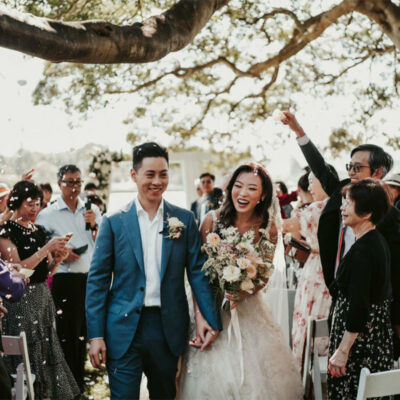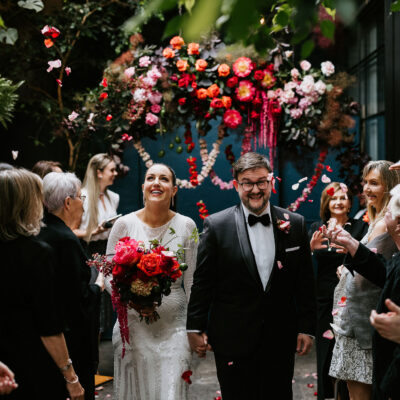 Wedding traditions we’re shaking up in 2026
Wedding traditions we’re shaking up in 2026
Pros and cons: Should I change my surname after I’m married?

So, you’re getting married. You’ve locked in the venue, said yes to the dress, and somehow survived the group chat with your bridesmaids. You’re ticking off the to-do list like a pro… until you hit that question: Should I change my last name after the wedding?
It’s a classic dilemma. Your Pinterest board is full of monogrammed “Mrs” mugs and future mailboxes with his surname. But your email address, your career, your Instagram handle… well, it’s all tied to your name. So what’s a modern bride to do?
Let’s break down the pros and cons, so you can decide whether to stick with your maiden name or take on a shiny new one.

Pros and cons of changing your surname after marriage // Image by @georgiebeckphoto
Pros: Reasons to take your husband’s last name
1. It feels romantic
There’s something undeniably sweet about sharing a last name with your husband. It’s old-school in the best way. For many brides, it symbolises unity, like officially starting your next chapter together as a team.
Think: signing your Christmas cards as Mr & Mrs, and it actually being true.
2. It makes things easier if you plan to have kids
Having the same last name as your future children can simplify things, especially when it comes to school paperwork, doctor’s visits, and airport security. If you’re planning to build a family, this can feel like a natural step.
3. It’s a clean slate
Some women aren’t super attached to their maiden name, and that’s okay. Maybe it’s long, hard to spell, or linked to complicated family dynamics. Marriage can be the perfect opportunity to rebrand, especially if your husband’s last name is a glow-up.
4. Tradition matters (to you)
Not everything has to be edgy and unconventional. Some brides simply love the idea of taking their husband’s name because it feels timeless and classic. If that tradition makes you feel connected to generations before you, that’s a beautiful thing; not something to apologise for.

Will Britt Hockley change her surname? Time will tell…
Cons: Reasons to keep your maiden name
1. You’ve built your life with it
If you’ve had a long career, built a personal brand, or have social media followers who know you by your maiden name, changing it can feel like starting over. It’s not just a name: it’s your identity. Literally. Your current surname might be on degrees, publications, business cards, email signatures… changing it could mean a whole lot of updating.
2. It’s a bureaucratic headache
Not going to sugar-coat it: changing your surname is a paperwork marathon. You’ll need to update your driver’s licence, passport, bank accounts, Medicare, super, insurance, email addresses, and pretty much your entire digital and legal life. It’s doable, of course. But not exactly a five-minute job.
3. You might just like your name better
Not all surnames are created equal. Maybe your husband’s last name is a little too plain, a little too tricky, or just doesn’t feel like you. No rule says you have to change it just because you’re getting married.
4. You don’t have to do what everyone else does
Yes, most women still take their husband’s surname, but that doesn’t mean you have to. Plenty of brides are choosing to keep their maiden name, hyphenate, or even do a legal name change years down the track. There’s no deadline and no wrong choice.
Options if you’re on the fence
Hyphenate
This lets you keep both names. Example: Emma Collins-James. It’s a good middle ground, especially if you want to show unity but still hang on to your own identity. The downside? Hyphenated names don’t always flow, and future kids may end up with a double-barrelled name and a double-barrelled partner, which gets complicated fast.
Legally change it, but keep your maiden name professionally
Some brides change their surname legally but keep their maiden name for work, social media, or creative projects. A little extra admin, but it keeps both worlds intact.Wait it outYou’re allowed to say, “I’m not sure yet.” Let the dust settle post-wedding and see how you feel. There’s no rush, no pressure, and no expiry date on a name change form.
Wait and decide later
There’s no rush. You don’t have to walk down the aisle with a decision made. You can take your time, try on the idea, and change your name a year (or even five) into the marriage.
View this post on Instagram
Name change checklist
If you do decide to go all-in on your new married surname, here’s a quick list of what you’ll likely need to update:
- PassportDriver’s licence
- Medicare
- Bank accounts & credit cards
- Superannuation
- Tax file number / ATO
- Utility bills (electricity, water, internet)
- Work email, LinkedIn, and business cards
- Social media accounts (optional, but let’s be real: it matters)
- Travel bookings and frequent flyer memberships
- Insurance policies
- Medical records
Start with the easy stuff (like your driver’s licence), then move on to the more annoying ones (like passports and bank accounts). Oh, and give your employer a heads-up too.
So, should you change your surname after marriage?
At the end of the day, your name is yours. Whether you take your husband’s surname, keep your own, hyphenate, or do a mix of both: it’s your call. No one else gets to decide what feels right for you.
Marriage is about love, partnership, and a shared future, not matching surnames. If the name change feels right, do it. If it doesn’t, leave it. Either way, you’re still just as married, just as committed, and just as fabulous.
Still tossing up your name change? Let Easy Weddings help with the rest of your planning… because the real stress is your seating chart. Find a curation of wedding suppliers right here.
 The wedding trends you’ll see everywhere in 2026
The wedding trends you’ll see everywhere in 2026  Splash or slash: What you should stop wasting your wedding budget on
Splash or slash: What you should stop wasting your wedding budget on